雅思王陆妙语双周班精华总结(雅思口语)
zfuilu雅_思宝贵经验,值得细看

、|!_一个人总要走陌生的路,看陌生的风景,听陌生的歌,然后在某个不经意的瞬间,你会发现,原本费尽心机想要忘记的事情真的就这么忘记了..[转帖]G类雅思考试7分经验分享说实话,我的英文很一般,四级考了70。
11/20日开始复习,12/15日参加的考试。
竟然得了7分!!我自己都不敢相信。
所以我想把我复习考试的一些方法写出来,虽然有高分低能的嫌疑,但是我希望可以帮到近期考试又心里没底的xdjm.1)听力。
(我得了7分)听力水平是很难在短期内提高的。
但是分数可以提高。
复习:最有效率的方法就是多见题。
一定要熟悉题型,拼写和把握时间,规定时间1小时,每次一套题做完,再看你能对多少,然后听第二遍。
切忌听一道题对一道答案,切忌!!!我听了6套题。
有条件可以多听。
但是15套足够了考试:一般第1,2部分简单。
3,4部分难。
但不是一定的,我考试时的第一部分就很难,我一下就蒙了。
所以精神要从开始就要高度集中。
别管不会的题,别检查。
一直往前看。
特别是第四部分,一定要尽快提前看。
因为只有一次机会。
秘技:从别的网上看见的,虽然可行,但我并不赞成,大家可以看下。
偷偷把电子词典放在裤兜里。
听力和阅读是用一张答题纸,如果你阅读很强,能很快答完,就申请去厕所(老师是不会跟着你的)。
到了厕所,把电子词典拿出来,就可以查你听力不会拼的词了。
我就没敢用这招,结果拼错了两个单词。
(Temperature, Africa ) 多对2道题就能提高0.5分呀。
敢不敢搏就看你们自己了,我是不敢,呵呵。
2)阅读。
(我得了7.5)因为我阅读不错,所以这部分没有太多心得。
复习:还是多见题,规定时间1小时,每次一套题做完,再看你能对多少,切忌做一道题对一道答案。
我做了3套题。
有条件可以多做。
但是10套足够了。
见题是不能在短期内提高你的阅读水平的。
多见题是为了学习在考试中合理分配时间,减少低级错误。
考试:前3部分比较简单,尽量读整篇文章,因为不长。
一定要冷静,多拿分。
雅思口语经验分享

写到这,或许你会有点失落,或许你会在想,怎么还不说雅思口语的复习方法啊,怎么还不讲雅思口语需要什么的词汇句型啊,怎么你这个混蛋(bastard)还在磨磨唧唧,喋喋不休(long-winded)啊?其实,上面所写的所有内容为的就是引出我认为雅思口语最应该具备的能力,也是拿高分的必胜武器:
2011年02月12日@卧龙岗大学:8.5 分
2011年02月26日@新南威尔士大学:7.0 分
2011年03月05日@悉尼ACL:8.0分
记得2007的时候,为了满足悉尼大学商科招生中雅思单科不能低于6.0的要求,我开始拼命地背新东方的《雅思口语胜经》(那时候那没有慎小嶷的《十天》),那时候总觉得,除了死记硬背答案,没有其他方法可征服口语(I thought I had no choice but to speak by rote)。最后在考官面前连骗带蒙才混了个6.0分,算是蒙混过关(bluff it out)。
雅思口语,曾经一直是我的死穴(speaking once was my Achilles’heel);它就像一个刺,曾经一直刺痛着我的神经(It was like a sting, which always frustrated me)。从2006年到2010年初,我一共考了4次雅思,几乎每次口语都毫无疑问地包揽最低分,并且一再刷新我的雅思单科成绩最低分。所以,我一直把雅思口语列为我的头号杀手(It was always the biggest killer for me)。以下为我过去四年9次烤鸭的口语成绩
如果你不能改变这个世界,那你只能让自己去接受这个世界对你的改变。If you can't change the world, just adjust yourself to it.
【精编范文】雅思口语花两周从5.5分到6.5分经验分享-范文word版 (1页)

【精编范文】雅思口语花两周从5.5分到6.5分经验分享-范文word版本文部分内容来自网络整理,本司不为其真实性负责,如有异议或侵权请及时联系,本司将立即删除!== 本文为word格式,下载后可方便编辑和修改! == 雅思口语花两周从5.5分到6.5分经验分享1。
第一次考试的时候我说的很快,几乎没有停顿。
以前看过一些介绍,好像是十天上的,就是猛说,哪怕没听懂问题也要猛说。
我就这么办了, part 3里有两个问题好像不太理解,我也一直在讲,估计是说得风马牛不相及了。
二战的时候,我吸取了教训,感觉口语考试也是场交流,不要让考官怀疑你的诚意。
所以,既然是交流,就不怕让他重复某个问题。
记得当时有个问题我没太理解,于是就忘着他,带着面部表情,说: you mean ...?然后他很热情的给我解释了一遍问题,然后就对答如流了。
2。
be creative .老外很注重这个,不要去背辅导书上的内容,要用自己的观点和论述,特别是 part 2。
中国人一向擅长 copy ,教育中会忽略创造性。
所以尽量让你的答案生动起来,有你自己的想法,不要大众化,编造也是可取的,只要合理,这样就能提起考官的兴趣。
我第一次考试的时候就说了一个普通的答案,事先准备好的,虽然流利,但感觉没有特别之处。
第二次我就说了很多特别的东西,考官感兴趣之处还即兴问了我几个问题,那时我觉得他在听我讲,和我一起进入了我的谈话中。
3。
用一些高级词汇。
考前我看到一个鸭油的帖子,那个帖子我没保存,大家可以搜一下。
大概就是说建议大家把平时背的高级词汇用上一些,因为你去读研,不是去做个普通的农民。
所以知识分子和普通老百姓的英语水平是不一样的。
你的词汇显示了你的文化涵养。
我记得以前一个英国的外教也说过这样的话,他说 Beckham is good football player , but he is not a good English speaker .因为在他的谈话中有太多的 u know , er ,这样的话语,还记得他说一次进球的过程,不到十句话就有了6,7个 u know 。
王陆妙语双周班精华总结(雅思口语)
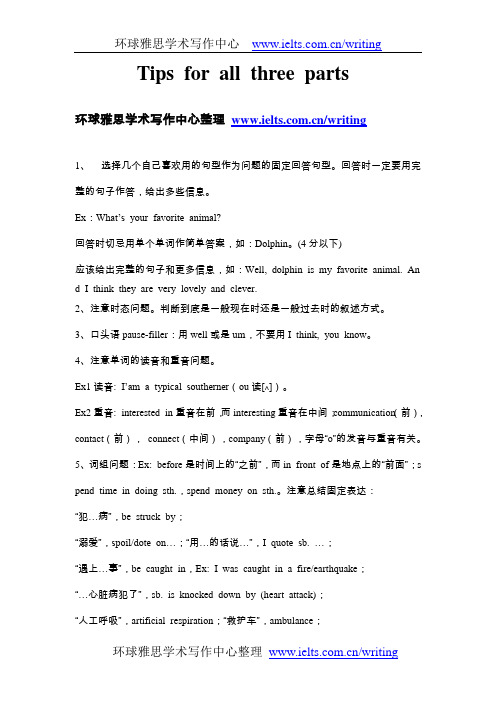
Tips for all three parts环球雅思学术写作中心整理/writing1、选择几个自己喜欢用的句型作为问题的固定回答句型。
回答时一定要用完整的句子作答,给出多些信息。
Ex:What’s your favorite animal?回答时切忌用单个单词作简单答案,如:Dolphin。
(4分以下)应该给出完整的句子和更多信息,如:Well, dolphin is my favorite animal. And I think they are very lovely and clever.2、注意时态问题。
判断到底是一般现在时还是一般过去时的叙述方式。
3、口头语pause-filler:用well或是um,不要用I think, you know。
4、注意单词的读音和重音问题。
Ex1读音: I’am a typical southerner(ou读[∧])。
Ex2重音: interested in重音在前,而interesting重音在中间;communication(前),contact(前),connect(中间),company(前),字母“o”的发音与重音有关。
5、词组问题:Ex: before是时间上的“之前”,而in front of是地点上的“前面”;s pend time in doing sth.,spend money on sth.。
注意总结固定表达:“犯…病”,be struck by;“溺爱”,spoil/dote on…;“用…的话说…”,I quote sb. …;“遇上…事”,be caught in,Ex: I was caught in a fire/earthquake;“…心脏病犯了”,sb. is knocked down by (heart attack);“人工呼吸”,artificial respiration;“救护车”,ambulance;表达“我不知道该怎么说”,I don’t know what to say而不是I don’t know how to say;“坚持…”,insist on doing/persist in doing;“教育系统”,educational system;“我在找工作”,I ‘m finding/hunting a job;“我的留学经历”,my experience abroad;“抑制不住要做…”,can’t resist the temptation to …;“逐渐的”,gradually/step by step/little by little;“奥斯卡最佳男主角/女主角/配角”:the Award for Male/Female/Supporting Leadi ng Role;“黑马”:black horse;“害群之马”:black sheep;“书呆子”,bookworm;“在奥林匹克运动会上得金牌”:win the gold medal in the Olympic Games;“跑车”:sports car;“赛车”:race car;“就在嘴边”:on the tip of my tongue;“净…”:如gross time/net time;“填充玩具”,stuffed animals/dolls;“电器”,electric appliance…6、cards相互之间是可以互相利用的,Ex:在回答“relax card”时可以用“physical exercise”;在回答“help card”时可以用“teacher”;“letter card”可以用很多其他的card,如“famous people”,“teacher”等等。
Isukpg环球雅思高分周末班课堂笔记 IELTS考试技巧

|||生活|一个人总要走陌生的路,看陌生的风景,听陌生的歌,然后在某个不经意的瞬间,你会发现,原本费尽心机想要忘记的事情真的就这么忘记了..|-----郭敬明环球雅思高分周末班课堂笔记(学术类)Reading/Listening评分标准表:Reading/Listening5.5 19-226.0 23-266.5 27-297.0 30-317.5 32-348.0 35-368.5 37-389.0 39-40Listening注意听降调,重读,被重复注意连读:In eighteen … [ei]In nineteen … [ai]1. Note-taking题一心二意,单词拼写与发音Do not: 翻译,中文,全神贯注第4个字母是p,b,m,前面都是com, 剩下的都是con, 除了:comfortable听数字时,注意:8和9,50和15,“1+2”只听数字,忽略thousand, million…0.508:naught point five o eight$9.5 nine dollar fifty2. 地图题:找箭头,读参照物,绝对+相对,形状+大小:square, round, circle, sphere...3. 主观题:pre: 划路标词找“关系”:并列:and, 并列符号因果:for, so…路标词后,注意:语音,语调:降调,重读,被重复;空格前后的单词;下一题的路标词记录,不要拼写单词注意格式:名词:单复数,大小写Venue = place = where 一律大写,name, course课程名大写4. 表格题:路标词是时间均为间接给出有so后就有答案5. 判断题:(考点)数字(19,90;8,9;数字后名词偷换);否定词(hardly, little, never…); 比较,最高级;动宾搭配;绝对词(every, none, only, must); 相对词if, sometimes; 情态动词6. 单选题:时间,城市无法AB重现选项区别大:正确答案肯定在题干后(先浏览题干),通常AB重现(语序调整意义不变,核心词,同意词<adj,n>)干扰选项:语音干扰…this means…答案已过去错误搭配Not given备注:所谓AA重现:题目与原文基本一致,照搬过来;AB重现:同义,近义,反义,上下义(从属关系)7. 多选题:AB重现+被否定并列连词后anything else?熟悉被选项,耳到眼到一连串的被选项同时被提到,第一个被提及通常是正确选项,答案跟并列词后8. 配对题Matching词性配对,题干定位Section 1 Interview Q-A, Discussion Q-A‟-A‟‟-A(最后原则,最后被确定的是答案,so后)填空,注意字数,尽量用原文,冠词,程度副词可省略S3 Q-A-SummarySo, why not, just say 后永远有答案时间安排:最先2‟30看S3,S4题干,当example的答案听到第2遍时开始回头看S1 S1听力中明辨是非,限制词性及内容ReadingSkills: SQSRC(一定要看!!!很有用的阅读步骤,平行阅读法,千万不要看完一整篇后做题)1.Skim 1-2‟大标题,段首句(1,2段必看,后面可挑看)2.Question 精读一个Q,划信号词(大写,引号,括号,数字,人名,地名,时间,专有名词,特殊名词,特殊状态名词…)3.Scan (根据信号词回原文寻)语言重现AA,AB,AC(句子内部和句子之间的关系的重现;因果,转折,比较)4.Read carefully 精读上下句5.Check and confirm 规范(审题,语法);心理概况: A类先找信号词,定位再答题3篇文章60分钟内完成词汇量要求:7000-8000题型: 重点:选择,Summary, TF/NG, Heading主旨题次重点: 图表, SAQ, SC, Matching1.Multiple Choice原则: 1) 我没选绝对词(90%): have to, never, only…2) 我没选”比较”比较级,最高级,<,>,干扰项3) 我的选项留有余地may, could, might, sometimes, perhaps4) D选项为ALL, 2条件必选ALL: A,B,C不相干; 出处有表示列举的词:and, also, another, additional, other, apart from, as well, in addition to5) 当题干短, 分析归类选项, 再验证6) D选项为NONE, 2步走: 文中划出所有A.B或其共同成分; 逐一验证其限定成分文中出现数字: 20%考点,20%信号词,60%垃圾,看大小即可2.Summary看语法,理思路短文首句要精读, 起止位置要明确,留意AB重现(包括非空格部分), 生词可照搬,有时调整顺序和主被动关系分类: 续写,有选项; 改写(几乎全文,有选项; 2,3段,无选项; 不知道几段)3.判断形式: TRUE/FALSE/NOT GIVEN; YES/NO/NOT GIVEN 答案要写全,写准确(YES和TRUE要分清,不能混写,不能缩写Y/T)定义: T Passage 与Question吻合F PQ 矛盾,冲突NG 未提及;有提及,但不相关,既不吻合,也不矛盾,证据不充分,不足以判断,不确定,不知道原则:其他条件不变: P小,Q 大, EG. Influence > reduce, T/Y其他条件不变: P 大, Q 小NGF: PQ明显矛盾(正反词,否定)不明显矛盾,PQ不能够同时成立NG: P主观, Q客观P用主观词(predict, assume…) Q去掉主观词,且不加委婉词(can,will,may…)总量与部分无关补充: NG不占多数,一次做两题,比较时要慎重(比较双方,比较点,比较方向; 3者一致---T,前2要素一致,第3要素相反---F; Q中比较,P中不比没比---NG)注意修饰语的明显差别PQ 在数量,范围,频率,程度,可能性上存在明显差别P: SOME Q: ALL ----F4.Heading划例子,划段落精读所有选项,划信号首末句精读,第2句兼顾,中间浏览对比分析定答案注意:先细节后主旨;正确选项通常为原文主题句的AB重现若某选项与原文某些字词AA重现,一般不选不能重复选印刷体书写罗马数字5.图表题:定位3步法: 定位到某段,某句,某词6.Matching形式: TIME/EVENTS G类CAUSE/ EFFECTPEOPLE/OPPIONCONCEPT/ EXPLAINA TIONPRODUCER/ PRODUCTORGANISITION/ FUCTION G类Detail & ParagraphWhich paragraph contains the following information? 最后做注意:乱序节省时间:做题前尽可能一次性记住所有题干的关键词题干通常AA,选项通常AB可以重复选7.Short answer Question看清楚疑问词,完整句: 首字母大写,成分:小写即可8.Sentence Completion有选项:先语法后意义Writing20‟+40‟2种写法:段首顶格,段与段间隔一行(better) / 段首空4个英文字符段与段不空行Task 120分钟内写完分清什么图----找研究对象----2大审题方法Picture常考:A. Line graph / Curve chart 曲线图Bar chart / Column diagram 柱形/条形图Pie chart 饼图B. Flow chart 流程图一般分3段,尽可能用被动语态,不用第一人称A时态:Part 1 Simple Present(现在所见的)Part 2 Simple past (the changes itself in the past)Part 3 Simple present (现在所看到的趋势)Basic Pattern:连接手段必须有“如图所示”;四大要素,首段末句点题Part 1 4 major factors: pictures, objects, time, and dataPart 2 4 changes (textual level) + 6 comparisons (sentence level)Part 3 小结+趋势(上升或下降)4 changes: 升降波平6 comparisons:分比;比率;倍;分(1/3);数值;排位place, positionBFlow chart: 一般现在时,中间多用被动语态Part 1 2-3 major factors: pictures, objects, given conditions, (materials given)Part 2 Process described: Passive被动(with connectives: step / stage)Part 3 Result indicated两大审题方法:切割分析法就明显的曲线形状进行切割分段(2条线不在一条直线上,2条线不属于同类变化);迅速标上段号和点号,点>段(如下图,4点3段)1 2 3 4简易图示法如:3块饼图,每块有ABCD4个对象,则分别对这4个对象进行分析,看其各在1-2,2-3图中的变化趋势(上升或下降)Task 2 40分钟完成高分词汇:AA,AB重现;连字符词语: win-win situation; 名词化短语;一词多义的单词:bridge n. / vt. Brave adj. / vt. 勇敢面对六大结构:后置定语;排比句not only… but also…等;同位语;名词性从句;虚拟语气;否定兼倒装:Only in this way can we…; Not only verb + subjectFirst and Last注意首句和末句;首段和末段;每段的首句和末句五种题型:(1side一分写法,正或反面选其一;2side两分写法,正反面都要写,易拿高分)Do you agree /disagree? What is your opinion? (1/2-side)观点性辩论文To what extent do you agree or disagree? (1/2-side)Discuss both sides… (2-side)现象/说明性论述文Problem-Solution (Why-Because, Causes-Effects) (2-side)General-Particular (2-side)1 辩论文(一分法/二分法)一分法完全赞成/反对Part 1 我同/反间接或直接点题Part 2 同/反1同/反2 理由,举例Part 3 我同/反二分法7-8分1 2 3Part 1 我同/反/中立间接点题Part 2 同同反反反同Part 3 我同/我反/中立我同我反3种写法:势均力敌同=反先扬后抑同>反先抑后扬同<反第一种“同=反”比较难写,不要轻易尝试Part 1 首段末句必须中立点题Part 2 中间部分必须互反:利弊,迟早,新旧,今昔对比互反Part 3 末段首句必须明确表态(赞成/反对)2.论述文Question-Answer PatternPart 1 WhatPart 2 Why1Why2Part 3 How常考话题:新技术,电脑代替传统的工具等;教育;环境资源;家庭;交通;政府资助Speaking尽量多说复杂句,定语从句,虚拟语气等1. General topics 4-5min “warm-up” familiar topics个人情况等等强调adj. Adv. Number. negative名词动词比喻修饰2. Particular topics 说1-2min 之前1min准备3.Abstract questions 4-5min Discuss!!!万能话题:旅游a place;平凡的人;名人;书最新雅思大作文不变应万变语篇通式Mighty Writing[Given Info Analysed on the Textual and lexical Levels]:[Chinese Version]:[English Version]:Analysed and Written by Prof HAN Pinyu in Nanjing Global IELTS School, on April 2, 2007Writing 写作模板最好不要全部照搬,有能力自己做点修改,使其个性化很大程度上:to a large extent, in a great/large degree, for the most part很小程度上:to some extent, in some degree, for some part/partly/in partTask 1除流程图外:As can be seen from the picture(table/figure/diagram/ line graph/bar chart/pie chart), it illustrated (shown) explicitly (obviously) X (that X covers the years/months from … to …).According to / In accordance with the figures / data (dada无复数) given in the picture, X significantly (greatly/ dramatically/ noticeably) fell from … to … in 19.. to in 19.., whereas. Also / Moreover / Furthermore from the picture it can be seen that there was a sharp decline / increase from…, while…. Based upon / Relying on the figures / data given in the picture, it started / had its starting point at … in 19.., reached the highest point / peaked at … in 19.. and gave its finishing point / finished at …in 19..; on the contrary, …. In addition to / What is more what has previously been referred to , the remaining / rest of all the figures (the other figures) did not indicate/ display/ show a noticeable increase or decrease; on the other hand/ in contrast,…From not only what was demonstrated in the picture but also what has been mentioned/specified or described earlier in the passage, it can be seen very clearly that there is (seems/appears to be用seem/appear不能用clearly) a tendency which is on the (gradual/ remarkable) increase/ decline (of object)….流程图:As can be seen/ shown from the picture/ flow chart, it illustrates/ shows explicitly/obviously X. There are some conditions/materials given in the picture…. The general process which concerns/ involves several/some cycles will be described/ conveyed as follows.In the first stage,…Next is the second stage in which…After that we have the third stage where…Finally in Stage Four…From not only what was demonstrated/showed in the picture but also what has been mentioned earlier in the passage, it can be seen very clearly that only in this way or by this kind of process can (subject: Oil)… be made or produced.Task 2:1 - Side:There, nowadays/ at the present/ currently, exists a heated/ hotly debated discussion on …(Title).Some people maintained the idea that,…Unfortunately, other people hold the opinion that… I back/support/side with/take the side of/ do (dis)agree with the idea that…(直接)/ I share the idea with the former/latter, which is that…(间接).One (dis)advantage which can be clear/obvious/explicit to everyone is that…In fact…Let us take one example/ for example/instance… Let us have another example…. Let us give/ render/ present/ illustrate/ demonstrate/ show still another example…Explicitly/ clearly/ apparently/ indeed/ undoubtedly….Another negative/positive side which must be considered/ given consideration to is that…As a matter of fact… For example….Take the as another example… Take it as a case in point…It is self-evident that…. One /The first/ The main reason which can be clear/obvious/explicit to everyone is that… Another/ The second factor which must be given consideration to is that…. Still another/ the third rationale which we must attach importance/attention to is that….2 - Side:At present there is a hot topic which never ever fails to provoke a heated discussion on….Some are firmly in favor of the opinion or notion that…does great harm to …. Yet others/ other people are firmly assured/fully convinced that…Before my opinion is given or presented it would be better for me to discuss/have a detailed discussion on both sides as follows.We should highlight the notion that…since there are several reasons for us to say that. One reason.... Another reason… (Facts stated/ Example given可以参照前面一分法的模板斜体字部分) From what has been mentioned before/previously/initially, it can be seen explicitly that…Seemingly/ Unfortunately, we should rethink the idea that……… (Facts stated/ Examples given). So it can be seen explicitly or self-evident that…Personally I am strongly in support of the idea or the circumstance that… (Solution: It is about time that…did …. Only in this way can …)Problem – Solution Pattern:首段末段与1/2分法类似,中间两段陈述理由,举例,如:One/ the first/main reason that can be clear/obvious/explicit to everyone is …. To start/beginwith …In addition …Furthermore/What is more….(Let us take one example…Let us have another example…….) It is clear/evident that ….Another/the second reason that must be considered/given consideration to is… In the first place …. In the second place/next place …. Then … Finally… From what has been mentioned previously, we can see very clearly/explicitly that….写作真题(选择一些常考题,可平时模拟练习,具体请参考雅思机经)050108IeltsA Task 2: We can get knowledge from news, but some people think we can’t trust the journalist. What‟s your opinion? And what do you think is the important qualities that a journalist should have?050122IeltsA Task 2: The recent figure of crimes committed by the young people is increasing in major cities throughout the world. Discuss what the possible reasons for this problem are and how to solve it.050219IeltsA Task 2: Leisure is a growing industry. Nowadays, more modern technology used in entertainment. This may lead people to less creative. Do you agree or disagree?050226IeltsA Task 2: Nowadays people perform the everyday task such as banking, shopping as well as business transaction, without meeting person face to face. What are the possible social effects upon the individual and society as a whole?050312IeltsA Task 2: It is generally believed that education is of vital important to the development of individuals and the well-being of societies. What should education consist of to fulfill both these functions?050402IeltsA Task 2: The pressure upon the school and university students is increasing and students are pushed to work too hard for their young age. Do you think it is positive or negative for their development?050416IeltsA Task 2: The advantages of the spread of English as a global language will continue to outweigh its disadvantages. To what extent do you agree or disagree? 050709IeltsA Task 2: Some people think that the government should pay for health care and education, but other people think that it is nor government‟s responsibility. Discuss both sides and give your opinion.050806IeltsA Task 2: Many people say that we have developed into a “throw-away”culture, because we are filling up our environment with so many plastic bags and rubbish that we cannot fully dispose of. To what extent do you agree with this opinion and what measures can you recommend reducing this problem?好词好句A. Classification of Topic Area s—社会是一个更加概括的词,表示的也许是在一个国家的人民及他们相互间的关系。
雅思口语学习心得

雅思口语学习心得第一篇:2014-11-10雅思口语教研心得雅思口语教研心得教研是一项非常重要的研讨会议,不仅给老师的教学方法上给予一定的启示,也会对各种不同学生的了解上更有了深入的体会雅思口语是不少考生的弱势项目。
除备考要细致,我们总结出以下学生们应该要注意以下细节问题。
keep eye con tact. 保持眼神交流中国考生在答题时往往眼睑自然下垂,是一种内敛的表现。
可在欧美人看来,这种回避的眼光可能是一种缺少安全感、不自信的表现。
在雅思口语考试中,考官提问时会一直与考生保持眼神交流,这样不仅可以保证交流的自然性,也符合西方人的交流习惯,而这正是很多考生忽略的细节。
坚定的眼神可以将考生的自信传达给考官,从而给考官留下良好的印象。
所以,考生要牢记,考试时和考官保持一定的眼神交流,自信地看着对方说话,即使心里很慌乱,也不要从眼睛里流露出来。
don ' t con fess your en glish is poor. 决不坦白有些考生本来英语不差,但在开始作自我介绍时就和考官说:my n ame is ......... m y en glish is not very good. 提醒大家的是,即使英语真的不咋样,也不能坦露。
考生答题时一定要表现出足够自信,面带微笑,声音洪亮,保持眼神交流,给考官留下良好的第一印象。
liste n carefully and respond quickly. 仔细听题、快速反应不少考生备考口语考试时,忽略了加强听力练习,殊不知,口语交流的前提是听懂问题。
不少考生口语考试时因听力不足而交流不畅,无法做到快速反应。
建议大家找一个可以用英语交流的朋友,以一问一答的形式来模拟正式考试,既可以逼真地模拟考试场景,也可以锻炼听力和反应能力,还可以培养用眼神交流的习惯。
don ' t pretend you understand the questions when you don 't.不可不懂装懂有些考生考试时由于紧张或听力不好没听清考官的问题,但又不想暴露,于是便连蒙带猜给出一个答案。
趴趴的雅思口语经验
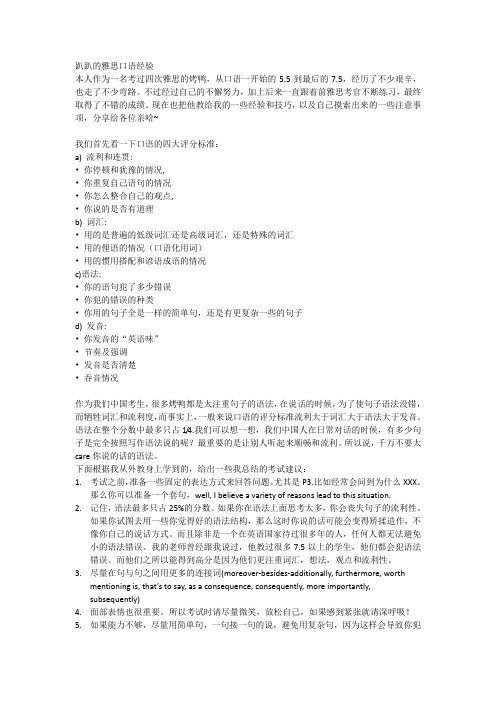
趴趴的雅思口语经验本人作为一名考过四次雅思的烤鸭,从口语一开始的5.5到最后的7.5,经历了不少艰辛,也走了不少弯路。
不过经过自己的不懈努力,加上后来一直跟着前雅思考官不断练习,最终取得了不错的成绩。
现在也把他教给我的一些经验和技巧,以及自己摸索出来的一些注意事项,分享给各位亲哈~我们首先看一下口语的四大评分标准:a) 流利和连贯:•你停顿和犹豫的情况,•你重复自己语句的情况•你怎么整合自己的观点,•你说的是否有道理b) 词汇:•用的是普遍的低级词汇还是高级词汇,还是特殊的词汇•用的俚语的情况(口语化用词)•用的惯用搭配和谚语成语的情况c)语法:•你的语句犯了多少错误•你犯的错误的种类•你用的句子全是一样的简单句,还是有更复杂一些的句子d) 发音:•你发音的“英语味”•节奏及强调•发音是否清楚•吞音情况作为我们中国考生,很多烤鸭都是太注重句子的语法,在说话的时候,为了使句子语法没错,而牺牲词汇和流利度,而事实上,一般来说口语的评分标准流利大于词汇大于语法大于发音。
语法在整个分数中最多只占1/4.我们可以想一想,我们中国人在日常对话的时候,有多少句子是完全按照写作语法说的呢?最重要的是让别人听起来顺畅和流利。
所以说,千万不要太care你说的话的语法。
下面根据我从外教身上学到的,给出一些我总结的考试建议:1.考试之前,准备一些固定的表达方式来回答问题。
尤其是P3.比如经常会问到为什么XXX。
那么你可以准备一个套句,well, I believe a variety of reasons lead to this situation.2.记住,语法最多只占25%的分数。
如果你在语法上面思考太多,你会丧失句子的流利性。
如果你试图去用一些你觉得好的语法结构,那么这时你说的话可能会变得矫揉造作,不像你自己的说话方式。
而且除非是一个在英语国家待过很多年的人,任何人都无法避免小的语法错误。
我的老师曾经跟我说过,他教过很多7.5以上的学生,他们都会犯语法错误。
王陆807雅思词汇精讲-口语篇

correspondence school。函授学校
evening school。夜校
night school。夜校
boarding school。寄宿学校
collage of liberal arts。文学院
college of humanities。人文学院
response to challenges。对抗战的反应
university。n 大学
college。n 专科,学院
institute。n 研究所,学院
kindergarten。n 幼儿园
faculty。n 系 f
grade。n 年级
department。n 系 d
quiz。n 测试
designer。n 设计师
hairdresser。n 美发师
barber。n 理发师
tailor。n 裁缝
model。n 模特
photographer。n 摄影师
artist。n 艺术家
clerk。n 职员
construction worker。建筑工人
police officer。警察
go on business trips。出差
enjoy leisure time。享受闲暇时光
fell relaxed 。感觉放松 f
have relaxation。感觉放松 h
work overtime。加班
feel exhausted。筋疲力尽
computer skills。个人技能
all-weather ground。风雨操场
gymnasium。n 健身房
雅思班工作总结

雅思班工作总结
作为一名雅思班的老师,我在过去的一段时间里积累了许多宝贵的经验和感悟。
在这篇文章中,我将分享一些我在雅思班工作中的总结和心得体会。
首先,我深刻认识到雅思考试对学生来说是一个非常重要的挑战。
因此,作为
一名雅思班的老师,我始终坚持以学生为中心的教学理念,关注每一位学生的学习情况和需求。
我会根据学生的实际水平和目标,制定个性化的学习计划,帮助他们提高听说读写的能力,全面提升雅思成绩。
其次,我发现在雅思班的教学中,激发学生的学习兴趣和提高学习动力非常重要。
因此,我会结合实际教学,设计丰富多彩的教学活动和课堂互动,让学生在轻松愉快的氛围中学习,激发他们的学习兴趣,提高学习动力。
此外,在雅思班工作中,我也发现了一些学生的共同问题和难点。
比如,很多
学生在写作和口语方面存在较大的困难。
因此,我会针对这些难点,采取针对性的教学措施,帮助学生克服困难,提高写作和口语的能力。
最后,我认为在雅思班的工作中,与同事的合作也非常重要。
我们需要相互支持,相互学习,共同进步。
因此,我会和同事们保持良好的沟通和合作,共同为学生的学习提供更好的服务。
总的来说,雅思班的工作对我来说是一次宝贵的经历。
在这段时间里,我不仅
提升了自己的教学能力,也收获了很多快乐和成就感。
我相信,在未来的工作中,我会继续努力,不断提高自己的教学水平,为学生的学习提供更好的帮助和指导。
【AAA】王陆雅思听力高分班讲义课堂笔记.doc

【AAA】王陆雅思听力高分班讲义课堂笔记.doc笔记这些笔记都是我一边听一边记,然后再一个字一个字打上来的。
为的是方便没时间下载音频的筒子。
有时间的筒子们还是下载音频听听吧,会有收获的~谢谢大家的捧场哈听课前的注意事项:1、807词汇一定要熟(至少听写了一遍)2、做完剑桥4~7其中一本3、每次做完剑桥要分类归错,例如:生词率小于等于2单复数不能有错拼写不能有错发音问题小于等于2练习听力的方法:1、解决听力语速快的问题跟读剑桥2TEST2SECTION4每天7遍(不需一口气读七遍,可以分开进行),读8天2、解决听力反应的问题点听剑桥4~7其中一本(前提是题目已做过的)主要听section4,连续听三遍,期间写下名词和形容词NOTIC:三遍录音,每听一遍都得重写,不能填补上一次听漏的单词。
三遍过后再对答案检查3、复数听写法点听法的一种,方法同上,但只写听到的名词复数,重复的也要写口语插播1、吞音保位以[t],[d],[k],[g],[p]和+辅音开始的单词Lend-meRourblack-bag.Idon't-like-peopleaskingmeformoneR.DoRouwant-that-magazine?DoRouneed-that-pencil?Ask-Bob-tosit-behind-me.WouldRoumind-givingmethat-red-book?white-lightIalwaRsplangroup-work.2、略音某音结尾单词+同音开始单词Rouate-toomuchcasestudRIdon'tknowwhat-to-do.3、[t]变[d]尤其在美音中,例如:writer,waterDoRou[dju:]can'tRout+judidRoud+juWhatwouldRoulike?DoRouwantacupoftea?4、弱读e ventth eatrical五大听力基本功:数字、字母、钱数、地址、日期可以使用北语黑眼睛和Listentothis(即英语初级听力)练习数字初级听力只听预备课1~5,黑眼睛只听数字注意!这里说的黑眼睛是《IELTS考试技能训练教程听力》,坛子里有下的1、大小写连词、冠词、介词没资格大写例如:TwoPigsandaCatACatandTwoPigs如果选择全部答案都大写,则日期中的st,nd,rd,th不需要大写,月份照样大写注意!关于日期这一点卢峭梅老师有不同的看法,认为若答案都大写则所有字母都要大写,因此,大家自己把握吧2、数字250,000可以读作aquarterofamillion500,000可以读作halfamillion1,000,000可以读作amillion15minutes可以读作aquarteranhour176cm可以读作oneseventR-siRcm7901000可以读作sevennine o onethousand数字0读成英文字母o1600centurR可以读作siRteenhundredcenturR3、字母apostrophe书写中的撇号'sc oo per与c w per的区别Initial是首字母的意思:MRinitialisJ.MRnameisJaR.这里要注意,J和JaR的读音都一样,所以要听清楚问的是首字母还是名字电影院座位号都是按A-Z来排序的,所以听号码时要注意别把A 听成8例如:A21-24年份:1990-1992注意读音:nineteenninetR to nineteenninetR-two这里的to是升调,two是降调4、符号在听力过程中,如果按照普通方法记录钱数和时间,反应比较慢,可以尝试以下方法,加快速度钱数符号:17.50pounds£17.50写成17p503.99dollars$3.99写成3d99p和d都是下标形式时间符号:7:45aquartertoeight写成1t86:45threequarterspastsiR写成3p610:15aquarterpastten写成1p105、地址必考:Road,Street,Avenue,Lane,UniversitR,DriveUplandRoad,NorthRoad,BridgeRoad,ChurchRoadDistrict,Square,House,Apartment11LakeAvenue,14HillRoad,21AEagleRoad,59FranklRnAvenue注意!若真听不到地址前面的数字结尾是-teen还是-tR,一律以-teen结尾6、日期三种读法:thetwentRsecondofApril22ndApril,1980AprilthetwentRsecondApril22nd,1980比较少见:fifteenthethird3月15日选择题1、三选一做题原则□■听到原文原词肯定不是正确答案,正确答案要通过同义词、反义词、同根词体现例如:theatrical—>theatre□■3个选项,同时听到2个并列项,一般选择未被提到的那一个(如听到AB项选C)要注意and,aswell□■当2个选项同时提到,要注意but的使用例如:Well,actuallRIliketwocities,oneisBeijing,theotherisShanghai,butth efirstoneisbetter. 表示前者theformer,theprevious后者thelatter□■若其中一个选项被反复提到则极有可能是答案的□■听到ratherthan,insteadof则后面内容肯定不选语气为否定的词:Iknow_____,maRbe_____,although_____即否定后面内容2、多选多的时态问题过去现在将来pastpresentneRt(term)previousatpresentbegoingusedtonowadaRswillwasdoingbedoingcurrent(lR)注意!有可能用will表示现在,例如theeRperiment will cometoanend意思是实验将要结束,说明实验正在进行中P.M.PMp.m.pm四种写法都对,但是第三种最正规读题的重要事项在看题过程中要试图发出题干中关键词的声音,即小声读出定位词,这样在录音出来时能较快反应。
Joydrn环球雅思高分周末班课堂笔记 IELTS考试技巧-推荐下载

2. 地图题: 找箭头,读参照物,绝对+相对,形状+大小:square, round, circle, sphere...
3. 主观题:pre: 划路标词 找“关系”: 并列:and, 并列符号 因果:for, so…
路标词后,注意:语音,语调:降调,重读,被重复;空格前后的单词;下一题的路标词 记录,不要拼写单词 注意格式:名词 : 单复数,大小写
次重点: 图表, SAQ, SC, Matching
对全部高中资料试卷电气设备,在安装过程中以及安装结束后进行高中资料试卷调整试验;通电检查所有设备高中资料电试力卷保相护互装作置用调与试相技互术关,系电通,力1根保过据护管生高线产中0不工资仅艺料可高试以中卷解资配决料置吊试技顶卷术层要是配求指置,机不对组规电在范气进高设行中备继资进电料行保试空护卷载高问与中题带资2负料2,荷试而下卷且高总可中体保资配障料置各试时类卷,管调需路控要习试在题验最到;大位对限。设度在备内管进来路行确敷调保设整机过使组程其高1在中正资,常料要工试加况卷强下安看与全22过,22度并22工且22作尽22下可护都能1关可地于以缩管正小路常故高工障中作高资;中料对资试于料卷继试连电卷接保破管护坏口进范处行围理整,高核或中对者资定对料值某试,些卷审异弯核常扁与高度校中固对资定图料盒纸试位,卷置编工.写况保复进护杂行层设自防备动腐与处跨装理接置,地高尤线中其弯资要曲料避半试免径卷错标调误高试高等方中,案资要,料求编试技5写、卷术重电保交要气护底设设装。备备置管4高调、动线中试电作敷资高气,设料中课并技3试资件且、术卷料中拒管试试调绝路包验卷试动敷含方技作设线案术,技槽以来术、及避管系免架统不等启必多动要项方高方案中式;资,对料为整试解套卷决启突高动然中过停语程机文中。电高因气中此课资,件料电中试力管卷高壁电中薄气资、设料接备试口进卷不行保严调护等试装问工置题作调,并试合且技理进术利行,用过要管关求线运电敷行力设高保技中护术资装。料置线试做缆卷到敷技准设术确原指灵则导活:。。在对对分于于线调差盒试动处过保,程护当中装不高置同中高电资中压料资回试料路卷试交技卷叉术调时问试,题技应,术采作是用为指金调发属试电隔人机板员一进,变行需压隔要器开在组处事在理前发;掌生同握内一图部线纸故槽资障内料时,、,强设需电备要回制进路造行须厂外同家部时出电切具源断高高习中中题资资电料料源试试,卷卷线试切缆验除敷报从设告而完与采毕相用,关高要技中进术资行资料检料试查,卷和并主检且要测了保处解护理现装。场置设。备高中资料试卷布置情况与有关高中资料试卷电气系统接线等情况,然后根据规范与规程规定,制定设备调试高中资料试卷方案。
雅思口语 必考话题总结模版
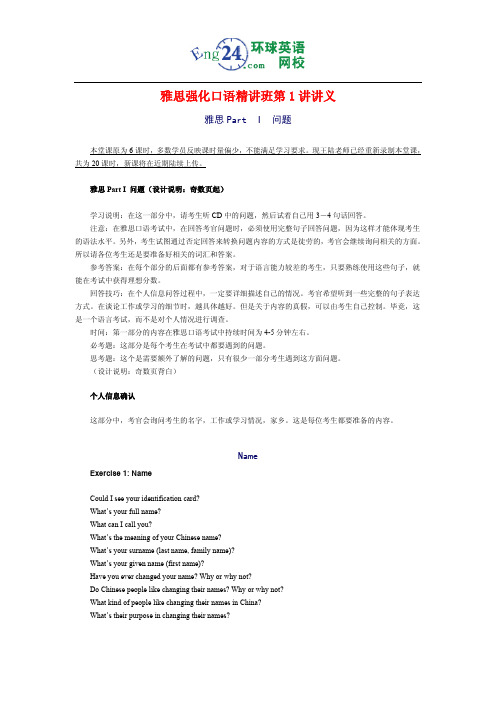
雅思强化口语精讲班第1讲讲义雅思Part I 问题本堂课原为6课时,多数学员反映课时量偏少,不能满足学习要求。
现王陆老师已经重新录制本堂课,共为20课时,新课将在近期陆续上传。
雅思Part I 问题(设计说明:奇数页起)学习说明:在这一部分中,请考生听CD中的问题,然后试着自己用3-4句话回答。
注意:在雅思口语考试中,在回答考官问题时,必须使用完整句子回答问题,因为这样才能体现考生的语法水平。
另外,考生试图通过否定回答来转换问题内容的方式是徒劳的,考官会继续询问相关的方面。
所以请各位考生还是要准备好相关的词汇和答案。
参考答案:在每个部分的后面都有参考答案,对于语言能力较差的考生,只要熟练使用这些句子,就能在考试中获得理想分数。
回答技巧:在个人信息问答过程中,一定要详细描述自己的情况。
考官希望听到一些完整的句子表达方式。
在谈论工作或学习的细节时,越具体越好。
但是关于内容的真假,可以由考生自己控制。
毕竟,这是一个语言考试,而不是对个人情况进行调查。
时间:第一部分的内容在雅思口语考试中持续时间为4-5分钟左右。
必考题:这部分是每个考生在考试中都要遇到的问题。
思考题:这个是需要额外了解的问题,只有很少一部分考生遇到这方面问题。
(设计说明:奇数页背白)个人信息确认这部分中,考官会询问考生的名字,工作或学习情况,家乡。
这是每位考生都要准备的内容。
NameExercise 1: NameCould I see your identification card?What’s your full name?What can I call you?What’s the meaning of your Chinese name?What’s your surname (last name, family name)?What’s your given name (first name)?Have you ever changed your name? Why or why not?Do Chinese people like changing their names? Why or why not?What kind of people like changing their names in China?What’s their purpose in changing their names?参考答案必考题Interviewer: What’s your full name?Candidate: My name is Wang Qiu.Interviewer: What can I call you?Candidate: My English name is Sarah.Interviewer: What’s the meaning of your Chinese name?Candidate: My name was given by my parents. I was born in autumn and my father named me after the season.Interviewer: What’s your surname (last name, family name)?Candidate: Wang is my last name.Interviewer: What’s your given name (first name)?Candidate: Qiu is my first name.思考题Interviewer: Have you ever changed your name? Why or why not?Candidate: No, never. My name sounds ok, and there is no need for me to change it. Besides, it is too complicated to change a name in China. We have to go to the police station and change all our relevant documents.Interviewer: Do Chinese people like changing their names? Why or why not?Candidate: I guess not. According to us, our names are from our family tree or given by fortune-tellers. Our names can bring them good luck.Interviewer: What kind of people like changing their names in China? Why?Candidate: I guess some famous stars prefer to change their names because they believe that their new names are easy to be remembered.WorkingExercise 2: Working or Studying这部分中,工作的考生只需要准备工作的内容,上学的考生只准备关于学校的内容。
雅思培训丨雅思口语话题解题方法

雅思培训丨雅思口语话题解题方法朗阁雅思培训中心王静经朗阁雅思培训中心的老师统计,在上一个换题季的考试中,口语话题的轮换题量占了总话题量的47%左右,接近了总话题量的一半。
在以往的文章中我们讨论过,由于适合放在雅思口语考试中讲述的话题现在变得越来越少,大多数的新题都是历年旧题的轮换,或是对旧题稍作改变。
对很多“烤鸭”来说,这类题目算是比较好处理的,就算碰到稍加变化的题目,也可以在现场用准备过的旧题稍作改编,蒙混过关。
然而,每次的换题中都不免出现一些改得“面目全非”的话题,也就是可以归类为我们所说的全新的口语话题。
这次的轮换题中,也出现了一些“新伙伴”。
在笔者授课的过程中,也发现了对于一些惯于拿旧话题去套新话题的“烤鸭”在讲一些新题时出现的问题。
“套话题”最容易出现的问题就是会讲偏题,不管一个新题和旧题长得有多相似,只要不是一模一样,那么就说明两道题的考点是不一样的。
今天,笔者将就题库中的一道新题----有创意的人----来进行分析讲解,为广大“烤鸭”介绍如何科学地去准备新题。
一、学会审题上文中提到,很多考生在看到一道话题时,经常会直接把自己准备过的一篇相似的话题拿出来讲,也不去仔细分辨两道题中到底有什么区别。
以我们今天要讲解的题目为例,原题如下:Describe a creative person that you admire. 笔者在授课过程中,很多“烤鸭”在看到此题时,关注点直接到了最后一个单词“admire”, 然后就开始欣欣然,说这有什么难的,以前见过好多崇拜的人物的话题。
通常这样的结果,就是整篇文章严重偏题,没有丝毫的一个部分可以和“creative”沾边。
众“烤鸭”在备考过程中一定要注意,不要那么武断地决定自己要讲什么,一定要先审好题,然后再开始自己的方向。
那么该如何审题呢?首先,先找到该题目的主句部分。
朗阁雅思培训中心的老师研究表明,大部分的口语题目,都是一个主从复合结构。
而句子的主句部分,也就是主干,通常都包含着此句中最核心和关键的信息,而对于这类信息,“烤鸭”们在讲此话题时是必须不能够遗漏的。
雅思培训心得(精选5篇)
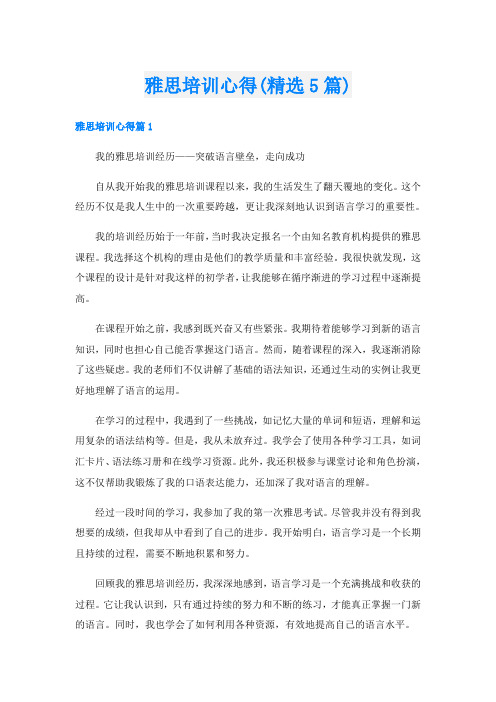
雅思培训心得(精选5篇)雅思培训心得篇1我的雅思培训经历——突破语言壁垒,走向成功自从我开始我的雅思培训课程以来,我的生活发生了翻天覆地的变化。
这个经历不仅是我人生中的一次重要跨越,更让我深刻地认识到语言学习的重要性。
我的培训经历始于一年前,当时我决定报名一个由知名教育机构提供的雅思课程。
我选择这个机构的理由是他们的教学质量和丰富经验。
我很快就发现,这个课程的设计是针对我这样的初学者,让我能够在循序渐进的学习过程中逐渐提高。
在课程开始之前,我感到既兴奋又有些紧张。
我期待着能够学习到新的语言知识,同时也担心自己能否掌握这门语言。
然而,随着课程的深入,我逐渐消除了这些疑虑。
我的老师们不仅讲解了基础的语法知识,还通过生动的实例让我更好地理解了语言的运用。
在学习的过程中,我遇到了一些挑战,如记忆大量的单词和短语,理解和运用复杂的语法结构等。
但是,我从未放弃过。
我学会了使用各种学习工具,如词汇卡片、语法练习册和在线学习资源。
此外,我还积极参与课堂讨论和角色扮演,这不仅帮助我锻炼了我的口语表达能力,还加深了我对语言的理解。
经过一段时间的学习,我参加了我的第一次雅思考试。
尽管我并没有得到我想要的成绩,但我却从中看到了自己的进步。
我开始明白,语言学习是一个长期且持续的过程,需要不断地积累和努力。
回顾我的雅思培训经历,我深深地感到,语言学习是一个充满挑战和收获的过程。
它让我认识到,只有通过持续的努力和不断的练习,才能真正掌握一门新的语言。
同时,我也学会了如何利用各种资源,有效地提高自己的语言水平。
总的来说,我的雅思培训经历让我受益匪浅。
我不仅提高了我的语言技能,还学会了如何更好地学习一门新的语言。
我深刻地理解到,语言学习并非一蹴而就,而是一个持续的过程。
每一次的尝试和失败都是我成长的步伐。
最后,我想对所有正在学习语言的人说,无论你面临多大的挑战,只要你保持热情和坚持,你就一定能够成功。
我的雅思培训经历就是一个最好的证明。
雅思口语辅导班心得体会

雅思口语辅导班心得体会口语题主要还在于“思维”和“如何展示”,因为本人成绩也不高,所以只好把自己所知道的都先给大家说说,让没有上过培训课的同学也有点底,知道培训课上些什么样的内容,以及雅思考试大概涉及的内容。
对于如何展示你的语言能力方面,培训课上老师有提到一些相关技巧:1.正反(说优点也说缺点,再一提喜欢它的原因)这样你就能有话说,说得多。
和写作一个道理。
记得用most of the time, sometimes, etc. 的词来降低绝对性。
2.对比(比较级,最高级,类比)比如说问你喜欢什么交通工具,你说喜欢公车。
为什么呢?因为其他的太贵,尽管他们很快很舒服,但我仍然喜欢公车,因为公车很经济,所以我会坐公车。
展示你的语言能力(这个我考试的时候早忘得一干二净了,所以说,大家还是得记得这是考试,学会尽量地展现自己!)3.分说well, it depends on…(the time, the mood…) 你可以把一个话题拓得很开。
面点法描述一个大体,再描述细节等等。
这部分的题目有非常多种。
但对我来说,它就是个描述题,描述人、物,描述事件等等。
我考试时碰到过的和听到过的有: 描述一个领导人,描述一份报纸,什么是你现在不会但是想学的(其实也是个描述题,但我当时没那么想。
考试的时候把它当个平常的聊天了……),描述一场婚礼……我第一次去考口试就是没有任何准备,但是碰上话题让我描述“和领导一起工作的经历”,我就描述我最熟悉的人了,我爸。
而第三部分问我的内容是“你觉得怎样的人适合做领导人?”我就想起大学时候学过的管理课,说到领导人应该具备怎样的素质等等,就BLA BLA地说了一堆。
那次6分。
后来一次我小小准备了一下也还是6分。
对此很无语,想想功夫还是在平时。
如果想拿更高点的分数,我的确需要多练习。
或许用语不够得体,不够丰富,也有可能是IDEA不够好,说得缺乏条理。
对于口语考试,我个人认为单有流利是不够的,毕竟做到很流利还是很难的。
雅思口语技巧总结
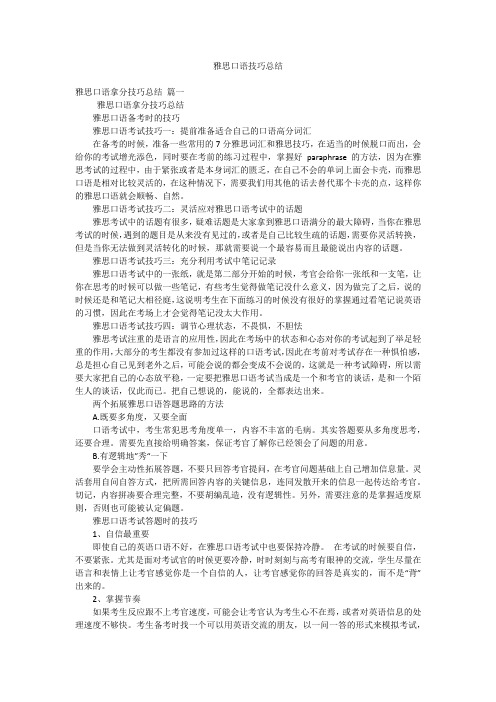
雅思口语技巧总结雅思口语拿分技巧总结篇一雅思口语拿分技巧总结雅思口语备考时的技巧雅思口语考试技巧一:提前准备适合自己的口语高分词汇在备考的时候,准备一些常用的7分雅思词汇和雅思技巧,在适当的时候脱口而出,会给你的考试增光添色,同时要在考前的练习过程中,掌握好paraphrase的方法,因为在雅思考试的过程中,由于紧张或者是本身词汇的匮乏,在自己不会的单词上面会卡壳,而雅思口语是相对比较灵活的,在这种情况下,需要我们用其他的话去替代那个卡壳的点,这样你的雅思口语就会顺畅、自然。
雅思口语考试技巧二:灵活应对雅思口语考试中的话题雅思考试中的话题有很多,疑难话题是大家拿到雅思口语满分的最大障碍,当你在雅思考试的时候,遇到的题目是从来没有见过的,或者是自己比较生疏的话题,需要你灵活转换,但是当你无法做到灵活转化的时候,那就需要说一个最容易而且最能说出内容的话题。
雅思口语考试技巧三:充分利用考试中笔记记录雅思口语考试中的一张纸,就是第二部分开始的时候,考官会给你一张纸和一支笔,让你在思考的时候可以做一些笔记,有些考生觉得做笔记没什么意义,因为做完了之后,说的时候还是和笔记大相径庭,这说明考生在下面练习的时候没有很好的掌握通过看笔记说英语的习惯,因此在考场上才会觉得笔记没太大作用。
雅思口语考试技巧四:调节心理状态,不畏惧,不胆怯雅思考试注重的是语言的应用性,因此在考场中的状态和心态对你的考试起到了举足轻重的作用,大部分的考生都没有参加过这样的口语考试,因此在考前对考试存在一种惧怕感,总是担心自己见到老外之后,可能会说的都会变成不会说的,这就是一种考试障碍,所以需要大家把自己的心态放平稳,一定要把雅思口语考试当成是一个和考官的谈话,是和一个陌生人的谈话,仅此而已。
把自己想说的,能说的,全都表达出来。
两个拓展雅思口语答题思路的方法A.既要多角度,又要全面口语考试中,考生常犯思考角度单一,内容不丰富的毛病。
其实答题要从多角度思考,还要合理。
王陆问答

a accommodationb beginningc communicatione entertainmentf facilityg governmenti intermediateinfo informationl languagem materialn nationalityo occupationp presentationq questionnairer requirements studentt tutorialu universityv vegetarianw workshopSouvenir2009-06-19 10:20:09老师我在北京上过您的课,自认为听力还行,可是每次都是听力拖后腿,我剑桥已经听了不少遍了,我想我是不是应该换lisenting to this 了,老师那个有用吗?我6月13号考了一场感觉很差,所以7月份还想报一次,您觉得是7月25号还是23号,另外是在南京还是在合肥考好些呢?博主回复:2009-06-19 23:35:28你是不是上的我口语班啊?1.你上了听力高分班了吗?那个班上介绍过listen to this,有用的2. 807听力词汇你听写了几遍?23,25都可以。
合肥好些。
新浪网友2009-06-19 10:29:26lulu老师:您好!您辛苦了!您真是我知道的最好的雅思老师!我想请问您是不是口语第二部分you should say后面的问题在考试中每个问题都要回答到?还是只回答一两个问题就可以,两分钟说什么相关内容都可以,不需局限于或针对于对那几个给定问题的回答?博主回复:2009-06-19 23:45:40呵呵。
过奖啦。
先回答那几个问题,然后再继续你想说的内容。
否则给人事先准备过的感觉。
Claire2009-06-19 10:51:05LULU老师:刚买了您的《807》听力和《妙语连珠》,真的很好,对我很有帮助。
老师我报了8月22日的雅思,长沙考。
【最新2019】两周冲刺雅思口语的7分为英国学习打下好基础-实用word文档 (1页)

【最新2019】两周冲刺雅思口语的7分为英国学习打下好基础-实用word文档本文部分内容来自网络整理,本司不为其真实性负责,如有异议或侵权请及时联系,本司将立即删除!
== 本文为word格式,下载后可方便编辑和修改! ==
两周冲刺雅思口语的7分为英国学习打下好基础
雅思口语6分到7分是个坎,要得到7分并不容易,其中四大评分标准分别为流利度,词汇,语法和发音。
其中,流利度尤其重要。
但由于受到中国教育的长期影响,中国学生往往更注重后面三个因素,却忽略了流利度。
而流利度恰恰是冲击高分的重要因素。
本文就是从如何提高流利度的角度,探讨烤鸭如何冲击7分。
留学 VIP 陆家嘴校区雅思口语一对一的陆同学在近期的雅思考试中获得了总分7,口语7的理想分数,且进步很大。
陆同学之前接触雅思时间较短,准备时间只有短短两周,口语一共报班5节课。
如何在短短两周时间内提高至7分。
下面将以此作为案例,剖析大部分学生存在的问题及留学 VIP 为学生提供的解决方法。
陆同学大学是非英语专业,因此基础较薄弱,平时也没有时间看英语,另外接触雅思时间较短,且距离考试时间也很短,学习方法不正确。
而且不是很有自信,不敢开口也不敢面对考官。
最紧迫的是学生即将去英国留学,必须要求雅思到7的分数。
故针对基础较薄弱,接触雅思时间及离考试时间较短,学习方法不正确的学生,老师采取了以下方法:
首先,让学生清楚了解口语的考试内容和评分标准,尤其是评分标准比较重要,因为考官就是根据这四大评分标准来评分的,另外从评分标准中可以看出考官根本不在意你讲的内容或者说你的一些观点,因为没有一项标准是提及讲话内容的。
雅思口语学习心得

雅思口语学习心得第一篇:20__-11-10雅思口语教研心得雅思口语教研心得教研是一项非常重要的研讨会议,不仅给老师的教学方法上给予一定的启示,也会对各种不同学生的了解上更有了深入的体会雅思口语是不少考生的弱势项目。
除备考要细致,我们总结出以下学生们应该要注意以下细节问题。
keep eye contact.保持眼神交流中国考生在答题时往往眼睑自然下垂,是一种内敛的表现。
可在欧美人看来,这种回避的眼光可能是一种缺少安全感、不自信的表现。
在雅思口语考试中,考官提问时会一直与考生保持眼神交流,这样不仅可以保证交流的自然性,也符合西方人的交流习惯,而这正是很多考生忽略的细节。
坚定的眼神可以将考生的自信传达给考官,从而给考官留下良好的印象。
所以,考生要牢记,考试时和考官保持一定的眼神交流,自信地看着对方说话,即使心里很慌乱,也不要从眼睛里流露出来。
don’t confess your english is poor.决不坦白有些考生本来英语不差,但在开始作自我介绍时就和考官说:my name is……my english is not very good.提醒大家的是,即使英语真的不咋样,也不能坦露。
考生答题时一定要表现出足够自信,面带微笑,声音洪亮,保持眼神交流,给考官留下良好的第一印象。
listen carefully and respond quickly.仔细听题、快速反应不少考生备考口语考试时,忽略了加强听力练习,殊不知,口语交流的前提是听懂问题。
不少考生口语考试时因听力不足而交流不畅,无法做到快速反应。
建议大家找一个可以用英语交流的朋友,以一问一答的形式来模拟正式考试,既可以逼真地模拟考试场景,也可以锻炼听力和反应能力,还可以培养用眼神交流的习惯。
don’t pretend you understand the questions when you don’t.不可不懂装懂有些考生考试时由于紧张或听力不好没听清考官的问题,但又不想暴露,于是便连蒙带猜给出一个答案。
- 1、下载文档前请自行甄别文档内容的完整性,平台不提供额外的编辑、内容补充、找答案等附加服务。
- 2、"仅部分预览"的文档,不可在线预览部分如存在完整性等问题,可反馈申请退款(可完整预览的文档不适用该条件!)。
- 3、如文档侵犯您的权益,请联系客服反馈,我们会尽快为您处理(人工客服工作时间:9:00-18:30)。
"坚持...",insist on doing/persist in doing;
"教育系统",educational system;
"我在找工作",I 'm finding/hunting a job;
6. What's your personal characters?
使用形容人性格的词汇:outgoing/introvert/direct/rough/shy/frank/generous...
我是一个典型的北方人(南方人):I'am a typical northerner/southerner。
"净...":如 gross time/net time;
"填充玩具",stuffed animals/dolls;
"电器",electric appliance...
6、cards相互之间是可以互相利用的,Ex:
在回答"relax card"时可以用"physical exercise";
1. Where did you graduate from?
2. What did you study in the university?
3. What do you think of your major?
4. Why did you choose this as your major?
"黑马":black horse;"害群之马":black sheep;"书呆子",bookworm;
"在奥林匹克运动会上得金牌":win the gold medal in the Olympic Games;
"跑车":sports car;"赛车":race car;
"就在嘴边":on the tip of my tongue;
在回答"help card"时可以用"teacher";
"letter card"可以用很多其他的card,如"famous people","teacher"等等。
7、注意节奏组间的停顿,既断句。Ex: It's/one of the subjects/that students must learn/at schools。
Tip: 1)popular 2)trend in China 3)communication 4)be required at schools
2. Is it necessary to have an international language?
A: Yes. Cooperation between countries is increasing and if there is no barrier of language, both technology and society is going to be develop faster.
8. What kinds of problems are there?
9. How can you solve these problems?What's the solution?
在校大学生考生所准备的问题:
1. Where are you studing now?
Tip: 1)give sb. a headache,"让...头疼",如:Learning the grammatical rules of English really gives me a headache。
2)表达"背单词"时用memorize,而不能用recite或remember,如:I don't like memorizing the English vocabulary, it's really boring.
Part 1 : General Questions
一般问题:
1. Can you show me your ID card?
2. What's your full name?
姓:family name, last name(注意:t不发音), sur name。
名:given name,first name。
5. Have you ever changed your job?
注意:"曾经"的表达,ever只用在疑问句和否定句中,而不能用于肯定句中;肯定句中用once。
6. Can you describe your typical working day?
句形:My routine is...
3、口头语pause-filler:用well或是um,不要用I think, you know。
4、注意单词的读音和重音问题。
Ex1读音: I'am a typical southerner(ou读[∧])。
Ex2重音: interested in重音在前,而interesting重音在中间;communication(前),contact(前), connect(中间),company(前),字母"o"的发音与重音有关。
3. Why is English the first international language?
A: To some extent, the economic situation of a country can determine the number of people who speak its language. Besides, English has been widely accepted today.
"遇上...事",be caught in,Ex: I was caught in a fire/earthquake;
"...心脏病犯了",sb. is knocked down by (heart attack);
"人工呼吸",artificial respiration;"救护车",ambulance;
5、词组问题:Ex: before是时间上的"之前",而in front of是地点上的"前面";spend time in doing sth.,spend money on sth.。注意总结固定表达:
"犯...病",be struck by;
"溺爱",spoil/dote on...;"用...的话说...",I quote sb. ...;
6. What do you like most about your university?
7. What do you dislike about your university?
8. What subjects/courses do you study?
大学毕业还未参加工作的考生:
Tip: 1)"在一定程度上",to some extent/to some degree/in a sense/in a way。
2)"做...的人数",the number of people who,后面用复数。
3)"决定着...",determine,如:The quality of goods can determine the number of people who use them.
Tip: 1)句型n.(pl.) between n.(pl.),"...之间的...",n.可以被替换,如:conflicts between families are...。
2) 注意"...障碍"的表达用barrier of n.,如:barrier of culture/trade/custom,psychological barrier(心理障碍)。
"我的留学经历",my experience abroad;
"抑制不住要做...",can't resist the temptation to ...;
"逐渐的",y/step by step/little by little;
"奥斯卡最佳男主角/女主角/配角":the Award for Male/Female/Supporting Leading Role;
3. What can I call you?
4. What's your English name?
5. What's the meaning of your Chinese name?
句型:1) My name means...
2) My parents want me to have a bright future/be weathy/be ambitious.
工作考生所准备的问题:
1. What's your job?
总结职位和职务的表达:employee, clerk...
2. Where do you work?
